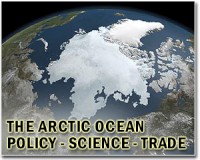| . |  |
. |
Washington (AFP) May 10, 2011 Top diplomats from eight Arctic countries will meet Thursday to set down rules for opening the vast region to fishing, tourism, oil and mineral exploration as global warming melts the ice. US Secretary of State Hillary Clinton and her colleagues from Canada, Denmark, Finland, Iceland, Norway, Russia and Sweden will gather in Greenland's tiny capital of Nuuk to discuss how to manage the area's development while protecting its fragile ecosystem. With its capital of 16,000 people, Greenland will be represented by Denmark, which handles foreign affairs for the sprawling self-ruled territory of 65,000 inhabitants neighboring northeastern Canada. Heather Conley, an Arctic expert at the Center for Strategic and International Studies (CSIS), said the gathering is historic, in part because it is the first time a US secretary of state will attend the ministerial talks. It "is a historic turning point to deepen and strengthen international cooperation in the Arctic as we seek to meet the dramatic challenges of the equivalent of a melting continent over the next several decades," she said. Clinton's deputy Jim Steinberg said the seventh biennial ministerial meeting of the Arctic Council -- composed of the eight countries and the region's indigenous groups -- also marks another step away from the Cold War. "We want to send a strong message that in the post-Cold War world the Arctic is a region of cooperation, not conflict," he told a gathering hosted by the CSIS think tank in Washington. "By working together to ensure the safety of human life in a newly emerging region of human activity we can show in particular that Russia and the United States are key actors in helping to propel cooperation on core issues." Clinton and her counterparts are due to sign an Arctic Search and Rescue Agreement, which the State Department said will be the first binding international agreement among the eight Arctic states. During talks in Iceland in December, the ministers drafted an agreement that divides the Arctic into specific search and rescue areas, with each nation legally responsible for its own territory. Icelandic officials said such an agreement was all the more important as an increasing number of people now sail through the Arctic as waterways open up with the melting ice. In August last year, a Russian oil tanker set off for China on a previously impassable route through the Arctic Ocean. Cruises with tourists are also venturing into the Arctic, particularly around the US state of Alaska. Earlier this month scientists said that warming in the Arctic is occurring at twice the global average and is on track to lift sea levels by up to 1.6 metres (5.3 feet) by 2100, a far steeper jump than predicted a few years ago. Steinberg said Washington wants the Nuuk talks to launch a task force designed to negotiate an instrument for handling Arctic oil spills. "We know that there are significant deposits of oil and gas that were in the past difficult to access and may become more accessible over time," he said. The United States wants the Arctic countries to be prepared to both prevent oil spills or other disasters and to create "effective mechanisms to deal with accidents should they happen," Steinberg said. More than one fifth of the world's undiscovered but technically recoverable reserves of hydrocarbons are located north of the Arctic Circle, according to the US Geological Survey (USGS). The region accounts for about 13 percent of the world's undiscovered oil and 30 percent of the undiscovered natural gas, USGS data shows. About 84 percent of the resources are offshore. Exploration off Greenland has yet to produce any commercially exploitable reserves, but that did not stop British firm Cairn from boosting its investment there by one billion dollars on the back of "encouraging" first results. Alaska, where the Prudhoe Bay oil field has been operating since 1977, is currently the most exploited area of the Arctic and its wells are responsible for more than one tenth of US oil production. Washington also sees the potential for new fisheries to emerge as the ice retreats, according to David Balton, the US deputy assistant secretary for oceans and fisheries. The meeting in Nuuk aims to establish a permanent secretariat for the Arctic Council, with Iceland offering to host it in Reykjavik and Norway proposing its northern city of Tromso, Balton said. Clinton, who leaves for Nuuk on Wednesday, will be accompanied by Interior Secretary Ken Salazar and other officials, a testament to the importance Washington attaches to the meeting. Clinton and the ministers will gather for dinner Wednesday evening.
Share This Article With Planet Earth
Related Links Beyond the Ice Age
 Stricken Russian nuclear icebreaker due at port: official
Stricken Russian nuclear icebreaker due at port: officialMoscow (AFP) May 10, 2011 A Russian nuclear-powered icebreaker that developed a radiation leak while on an Arctic mission was due Tuesday to arrive in the Barents Sea port of Murmansk after a five-day trek. The 21,000-tonne Taimyr vessel shut down its 171-megawatt nuclear reactor on Saturday and will rely on diesel engines to make its way into port some time before 2000 GMT, a Rosatomflot nuclear fleet official said. ... read more |
|
| The content herein, unless otherwise known to be public domain, are Copyright 1995-2010 - SpaceDaily. AFP and UPI Wire Stories are copyright Agence France-Presse and United Press International. ESA Portal Reports are copyright European Space Agency. All NASA sourced material is public domain. Additional copyrights may apply in whole or part to other bona fide parties. Advertising does not imply endorsement,agreement or approval of any opinions, statements or information provided by SpaceDaily on any Web page published or hosted by SpaceDaily. Privacy Statement |